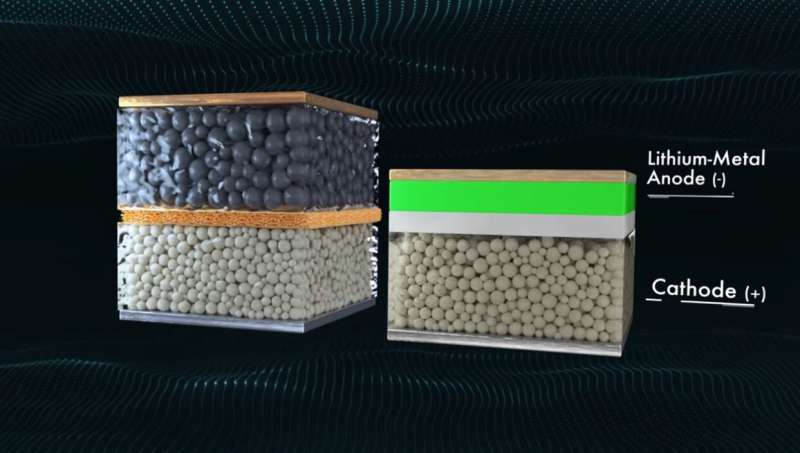More powerful, longer lasting, faster charging.
Those promises are being made about a newly designed lithium battery that could up-end the current race to power a future generation of electric vehicles.
QuantumScape, backed by Volkswagen and Bill Gates, announced at a virtual Battery Day press conference that its 10-year effort to produce a solid-state lithium battery has taken a major leap forward in its latest tests of the concept.
Current lithium-ion batteries contain a liquid serving as an electrolyte that permits lithium ions to travel between a positive cathode and negative anode, generating energy in the process. They are key components of laptops and smartphones as well as vehicles.
But automotive lithium-ion batteries have drawbacks: Charging time can be significant, they contain flammable contents that can ignite in a crash and they can freeze in very low temperatures. Researchers for years have tested superior materials such as polymers and ceramics that remedy these problems.
QuantumScape's answer is the lithium-metal battery. A dry ceramic separator takes the place of the liquid electrolyte and allows for more efficient transfer of energy as ions traverse paths. The battery is not 100 percent solid-sate—there is a gel component in the new battery—but it appears to have eliminated the drawbacks of the liquid electrolyte. It works in cold weather without freezing and suppresses growth of electrolyte dendrites that hamper lithium-ion battery efficiency.
Test results have been impressive. Lithium-metal powered vehicles can travel 80 percent farther than those equipped with lithium-ion batteries. They also are longer lasting: they maintain more than 80 percent of capacity after 800 charging cycles, far greater than current batteries. A company blog states this could translate into batteries that will power a vehicle "hundreds of thousands of miles" before needing replacement.
And it has a rapid charging time, up to 80 percent of battery capacity in just 15 minutes. (Is the recurrence of the number "8" in these specifications a subliminal nod to the potentially lucrative China market, where "8" is considered a lucky number?)
"We think that we're the first to solve solid-state," Jagdeep Singh, founder and CEO of QuantumScape, said recently. "We don't see anything on the horizon that's going to be close to what we're doing."
But QuantumScape is not alone in the pursuit of a better battery. China's battery manufacturing giant CATL, LG Chem, Samsung, Panasonic and Tesla have all joined in the race. Toyota was slated to unveil a solid-state cell at this year's Tokyo Olympics before the pandemic scuttled those plans.
A startup called Solid Power has begun manufacture of a similar type battery with a sulfide-based electrolyte that is highly conductive. Ford, BMW and Hyundai have joined in the effort.
QuantumScape has not revealed what its electrolyte is composed of, but MIG Technology Review reports some experts believe it is an oxide known as LLZO, seen as a promising electrolyte candidate for solid sate batteries.
QuantumScape still faces challenges. Tests on the new battery have been on single-layer cells. The final version of the battery will require up to 100 layers, and as the thickness increases, so do potential roadblocks and problems.
But the concept has been greeted with enthusiasm.
"The hardest part about making a working solid-state battery is the need to simultaneously meet the requirements of high energy density, fast charge, long cycle life and wide temperature-range operation," said 2019 Nobel Prize winner Stan Whittingham, a co-inventor of the lithium ion battery. "This data shows QuantumScape's cells meet all of these requirements, something that has never before been reported. If QuantumScape can get this technology into mass production, it holds the potential to transform the industry."
More information: www.quantumscape.com/
© 2020 Science X Network
























